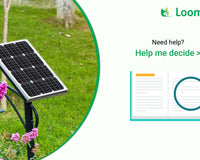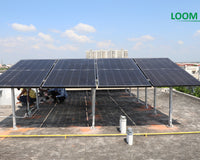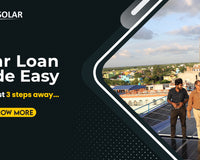Many locations in India are facing problems due to power cuts this summer season as all electrical appliances run on the national grid. I am living in the Delhi NCR region and observing long hours of power cuts in residential, commercial, and industrial areas. We are all well aware of this current situation in the summer season. We cannot live without fans, coolers, refrigerators, water pumps, and air conditioners. So, it's high time to understand the power demand of our country and take the necessary measures accordingly.
According to the news, the power demand is projected to peak at 235 GW during the daytime and 225 GW during the evening hours in May, and 240 GW during the daytime and 235 GW during the evening hours in June 2024, as mentioned in the statement. The power ministry has estimated around 260 GW of peak demand during this summer season. So, wouldn't it be a fantastic solution if we could use our empty rooftops to generate electricity?
How can we generate electricity at home?
Yes, we can generate electricity at home using solar energy, wind energy, and various other mediums, but the most efficient way to generate electricity is using solar power because it is clean, silent, and budget-friendly. Solar energy can generate electricity at a lower cost than traditional methods. For this, we need a solar panel, inverter, battery, and balancing of systems to generate electricity.
How many solar panels are required for home purposes?
Generally, residential properties are in various forms and sizes, such as small houses, individual houses, flats, builder floors, group housing societies, farm houses, villas, resorts, and more. The electricity provided by DISCOM is both rural and urban. You can choose the solar panel capacity based on your home loads and monthly electricity bills. Here are some suggestions to help you understand your requirements: If you have a small house where you want to run four to five lights, three to four fans, one to two coolers, one television, and some necessary appliances, then two to four solar panels should be enough. Along with them, you would also need to install two lead-acid batteries and a solar inverter. If you need to run heavy appliances such as air conditioners, submersible water pumps, induction, and basic home appliances, then you should consider six to ten solar panels. Here, the number of batteries and solar inverter capacity will increase. Ideally, a 3kW solar inverter and four lead-acid batteries or one lithium battery will be installed here.
What should be the budget for installing solar panels in your home?
A rooftop solar installation is a one-time investment that will benefit you for a very long time. It is one of the best investment opportunities to generate extra income per month. So, you should do proper planning about it. The starting budget for solar panel installation is approximately Rs. 50,000 (for those who already have an inverter and battery) and Rs. 1,00,000/kW (for a completely new system). If your requirement is above 1 kW, then we recommend booking a site survey with us. Our engineer will visit your installation location and understand your requirements. On the basis of that information, we will provide budget-friendly solar quotes in which we mention product details, warranty, specifications, and more.
Frequently Asked Questions
Q. What is the cost of a 1 kW solar panel?
A. The cost of 1 kW of solar panels can be anywhere between Rs. 36,000 and Rs. 40,000 (everything included) and can be purchased online as well as from the local market.
Q. How many ACs can run in a 3 kW solar system?
A. 3 kW stand-alone solar system (also known as an off-grid solar system) has a 3 kVA PCU (power conditioning unit), which can run a maximum load of 2400 watts. So, we recommend running a single 1.5-ton inverter AC or two 1-ton inverter ACs. If you want to run a normal AC, you must check its jerk current using a clamp meter.
Q. Is 1 kW enough to run a house?
A. 1 kW solar panel is sufficient for a house with two to four fans, fine to ten lights, one cooler, one refrigerator, and one TV running at the same time, but for larger families, we recommend a site survey to understand how many kilowatt solar system would be required.
Q. How large is a 1 kW solar panel?
A. The size of the 24V solar panel is 7 ft. * 4 ft.; we can also say it's almost equal to the size of a single bed, and when installed, 1 kW solar panels require approx. 60 sq. ft. of shadow-free area.
Q. What is the cost of one solar panel?
A. The cost of a single solar panel in 12V is Rs. 11,200, and the cost of a single solar panel in 24V is Rs. 20,000, including everything.
Q. What is the cost of a 3 kW solar panel?
A. The cost of a 3kW solar panel is only around Rs. 1,08,000 to 1,20,000 (everything included), but for a complete solar system, you would have to invest approximately Rs. 1,80,000 (for a grid-connected solar system) and Rs. 3,00,000 (for a stand-alone solar system).
Q. Can a solar panel run AC?
A. Yes, you can, but not directly on solar panels. You would also have to install an inverter and battery along with solar panels for this.













2 comments
fasgasg
The buzz around Titan Edge XL Gummies Reviews has been overwhelmingly positive. Users report noticeable improvements in their energy levels, stamina, and performance. Many reviews highlight the gummies’ ease of use compared to conventional supplements.
https://virmax.omeka.net/
https://forcebeast.omeka.net/
https://prelox.omeka.net/
https://spartan.omeka.net/
https://titanedge.omeka.net/
https://t.co/9oZJoxsJDw
https://t.co/OFUb0lNRVH
https://t.co/xJhcXSopXl
https://t.co/9o30e6cWgq
https://t.co/g7toWR1TAn
https://sites.google.com/view/knox-47-maleenhancement/home
https://www.facebook.com/Knox47MaleEnhancementbuy/
https://www.facebook.com/groups/knox47maleenhancementshop
https://groups.google.com/g/knox47-maleenhancement
https://colab.research.google.com/drive/1T2hOr-XfK51nyvyV2tK-xpK3GzxkHQBY?usp=sharing
https://colab.research.google.com/drive/1kixe5P3c4xdCQnxfoVI00BXM4nYgRzYP?usp=sharing
https://colab.research.google.com/drive/1FTAKYwZrIhQrU5gla3WtAM-2GjCEuSea?usp=sharing
https://knowt.com/note/2e2bf3ae-26f9-4755-81e9-2e81cca5a1dc/Knox-47-Male-Enhancement-Is-Safe-to-Use
https://knowt.com/note/d7b08b33-e427-4c0c-990f-d06894b5dc8b/Knox-47-Male-Enhancement—-Does-it-Work
https://knox47756.omeka.net/
https://knox47dugu.omeka.net/
https://knox47sideeffects.omeka.net/
https://whoherbs.com/endurix-cavalor-horse-feed-enhance-horse-performance/
https://whoherbs.com/endurox-prime-male-enhancement-enhance-your-erection-with-satisfaction/
https://whoherbs.com/true-keto-fusion-tired-of-slow-results-results-guaranteed/
https://whoherbs.com/alphastride-male-enhance-fully-loaded-with-stamina-erection/
Tanu
https://www.facebook.com/Ember.Ghee.Male.Enhancement/
https://knowt.com//note/19eb0629-5da0-49aa-a73b-800f375e9970/Ember-Ghee-Male-Enhancement-Mens-Healt
https://knowt.com//note/3f68b784-e585-459d-91d6-2cb0e5a74942/Ember-Ghee-Male-Enhancement-For-ED-Impro
https://knowt.com//note/734b6a20-46f6-450a-bafc-a48b1760ecbb/Ember-Ghee-In-Penis-Enlargement-Does-It
https://knowt.com/note/875be46a-dcb7-46da-b1d4-fa24867335e0/Ember-Ghee-Dietary-Supplement—-Pills-Fo
https://colab.research.google.com/drive/1VdAC1bxjwjPEadVYhEp6T9Hoobk6L36M?usp
https://colab.research.google.com/drive/1vyaYxrY-OGzKEaOKxLSq2WDmNLdFZFNU?usp
https://colab.research.google.com/drive/1XwFrbIj-0wGNIZ7kIqEWME8B5bPcYeXk?usp
https://colab.research.google.com/drive/1AX0og0XMmMlnPpUu5HteHeO7J6-UvAnZ?usp
https://colab.research.google.com/drive/1AQ9As9BEarifyR8ta5qLAwFZ8OFWtJ_2?usp
https://emberghee.omeka.net/
https://emberghee.omeka.net/ember-ghee-for-ed
https://emberghee.omeka.net/ember-ghee-pills
https://emberghee.omeka.net/ember-ghee-male-enhancement
https://emberghee.omeka.net/ember-ghee-reviews
https://colab.research.google.com/drive/1hm3PizoeMgvr2uE0sKlcKzu9OSr7tXaM?usp
https://colab.research.google.com/drive/1a4KIZmBpMsxuUgp36FFtmqW338G0bnOn?usp
https://www.facebook.com/Vitality.Male.Enhancement/
https://www.facebook.com/VirileFlowMaleEnhancement
https://www.facebook.com/Velotal/
https://www.facebook.com/Velotal.Male.Enhancement/
https://doesthephoenixeddevicework.omeka.net/
https://doesthephoenixeddevicework.omeka.net/does-the-phoenix-ed-device-work
https://doesthephoenixeddevicework.omeka.net/the-phoenix-erectile-dysfunction-device
https://thephoenixerectiledysfunctiondevice.omeka.net/
https://thephoenixerectiledysfunctiondevice.omeka.net/the-phoenix-erectile-dysfunction-device
https://thephoenixerectiledysfunctiondevice.omeka.net/does-the-phoenix-ed-device-work
https://knoxformen.omeka.net/
https://knoxformen.omeka.net/knox-47-for-men
https://knoxformen.omeka.net/knox-47-reviews
https://balancenz.omeka.net/
https://balancenz.omeka.net/glyco-balance-new-zealand
http://balanceau.omeka.net/
https://balanceau.omeka.net/glyco-balance-australia
https://lycocare.omeka.net/
https://lycocare.omeka.net/glyco-care
https://www.facebook.com/Endurix.ME/
https://knowt.com//note/7a29e6a2-96c5-41ca-b055-1b1821b40819/Endurix-Male-Enhancement-Uses-Dosage
https://knowt.com//note/963f3411-c688-406d-8691-7afaafbfd1a1/Endurix-For-Men-Male-Enhancement—Is-It-
https://knowt.com//note/2bceeefb-dcb4-4e24-8bdd-08ad09cbf010/Endurix-In-Penis-Enlargement-Does-It-W
https://colab.research.google.com/drive/1H83iPdIWoJQqFIIUFKybGK3KZdSMX1wk?usp
https://colab.research.google.com/drive/1SWXzNWDgnlggrgh9XjHutFZDRBwM7gVF?usp
https://colab.research.google.com/drive/1SWXzNWDgnlggrgh9XjHutFZDRBwM7gVF?forum
https://colab.research.google.com/drive/1JTygnRB32apNyhZXapEdJ3VOqO5nhJ3g?usp
https://endurix.omeka.net/
https://endurix.omeka.net/endurix-pills
https://endurix.omeka.net/male-libido-supplement